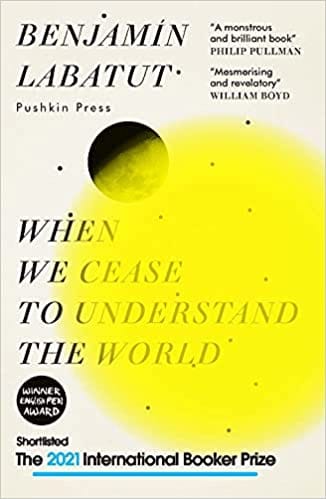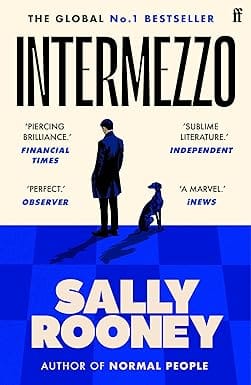-
Non-ficton
- Non-ficton
-
Contemporary Fiction
- Contemporary Fiction
-
Children
- Children
-
Comics & Graphic Novels
- Comics & Graphic Novels
-
Non-Fiction
- Non-Fiction
-
Fiction
- Fiction
When We Cease to Understand the World shows us great minds striking out into dangerous, uncharted terrain. Fritz Haber, Alexander Grothendieck, Werner Heisenberg, Erwin Schrödinger: these are among the luminaries into whose troubled minds we are thrust as they grapple with the most profound questions of existence. They have strokes of unparalleled genius, they alienate friends and lovers, they descend into isolated states of madness. Some of their discoveries revolutionise our world for the better; others pave the way to chaos and unimaginable suffering. The lines are never clear. With breakneck pace and wondrous detail, Benjamín Labatut uses the imaginative resources of fiction to break open the stories of scientists and mathematicians who expanded our notions of the possible.
Review
We may be familiar with such things as Schrödinger's cat and Heisenberg's uncertainty principle... but the sheer audacity, the utter insanity of the ideas and the thinkers who discovered these ideas has never, in my experience, been so vividly and terrifyingly conveyed as in this short, monstrous, and brilliant book ― Philip Pullman
Absolutely brilliant. I was utterly gripped and wolfed it down. It feels as if he had invented an entirely new genre ― Mark Haddon, author of 'The Porpoise'
Labatut uses fiction to crack open the stories of scientists and mathematicians whose expanded our notions of the possible, while also presenting them as human, all too human ― Dazed
A wholly mesmerising and revelatory book. A blend of limpid scientific exposition and bravura fictional gloss. Completely fascinating -- William Boyd
"Double physics!" Nothing in the school time-table was as unwelcome as those two words. Benjamín Labatut's When We Cease to Understand the World is doubly welcome: as a thrilling account of theories of physics, and as a series of highly-wrought imaginative extrapolations about the physicists who arrived at them -- Geoff Dyer
I absolutely loved this. The writing crackles with energy. What a triumph. I hope it does really well and finds multitudinous readers ― Cathy Rentzenbrink, author of 'The Last Act of Love'
A dazzling associative caper full of graceful arabesques linking continents and centuries and ideas ― Sunday Times
Remind[s] us of fiction's power to take us to another world and expand our understanding of this one... When We Cease to Understand the World showcases the minds seeking to pierce the mysterious heart of mathematics ― Guardian
The strangest and most original book I've read for years. It hovers in a state between fiction and non-fiction, or wave and particle, and makes an account of modern mathematics and science into something as eerie as a great ghost story -- Philip Pullman ― New Statesman, Books of the Year
It is a story about nature's fightback against human interference. In other words it is the story of the 21st century. In a literary industry obsessed with genres, it belongs to none -- Paul Mason ― New Statesman, Books of the Year
Compelling, startling and utterly original. This book about physics is a work of art ― Christie Watson
[A]n exquisitely written and continuously fascinating hybrid work of fiction and history ― Irish Times
It may be possible to actually feel your brain getting bigger as you read ― Evening Standard
Tantalising... This is a truly thrilling work of imagination and chutzpah ― Big Issue
The new Bolaño ― Revistas Lecturas
Labatut shakes his readers and gifts them thought-provoking images, planting in them the necessity to read everything he's written and everything he writes as quickly as possible ― La Tercera
Labatut penetrates into the heart of a reality that only few have seen before him - and no one has yet described. A book of terrifying beauty ― Wolfram Eilenberger, author of Time of the Magicians
Remarkable... melodiously poetic, but precise... Due to the increasing space that Labatut grants to fiction, he succeeds in giving an aesthetic answer to the question of the limits of knowledge: where there is uncertainty, literature grows a special power to enable experience. In this way, fiction can preserve the enlightenment of the blind ― Die Zeit
He meticulously describes the moods and experiences of his historical protagonists. With this fictional approach, Labatut creates a bewitching closeness and immediacy. And at best a deeper, almost poetic understanding of what Schwarzschild's singularity or Heisenberg's uncertainty principle actually mean for our reality ― Deutschlandfunk Kultur
The limits of human knowledge: this is the territory in which Labatut, with great vigour and extraordinary intellectual rigour, enters in this admirable book ― Expresso (Portugal)
About the Author
- Home
- Contemporary Fiction
- When We Cease to Understand the World
When We Cease to Understand the World
SIZE GUIDE
- ISBN: 9781782276142
- Author: Benjamín Labatut and Adrian Nathan West
- Publisher: Pushkin Press
- Pages: 192
- Format: Paperback
Book Description
When We Cease to Understand the World shows us great minds striking out into dangerous, uncharted terrain. Fritz Haber, Alexander Grothendieck, Werner Heisenberg, Erwin Schrödinger: these are among the luminaries into whose troubled minds we are thrust as they grapple with the most profound questions of existence. They have strokes of unparalleled genius, they alienate friends and lovers, they descend into isolated states of madness. Some of their discoveries revolutionise our world for the better; others pave the way to chaos and unimaginable suffering. The lines are never clear. With breakneck pace and wondrous detail, Benjamín Labatut uses the imaginative resources of fiction to break open the stories of scientists and mathematicians who expanded our notions of the possible.
Review
We may be familiar with such things as Schrödinger's cat and Heisenberg's uncertainty principle... but the sheer audacity, the utter insanity of the ideas and the thinkers who discovered these ideas has never, in my experience, been so vividly and terrifyingly conveyed as in this short, monstrous, and brilliant book ― Philip Pullman
Absolutely brilliant. I was utterly gripped and wolfed it down. It feels as if he had invented an entirely new genre ― Mark Haddon, author of 'The Porpoise'
Labatut uses fiction to crack open the stories of scientists and mathematicians whose expanded our notions of the possible, while also presenting them as human, all too human ― Dazed
A wholly mesmerising and revelatory book. A blend of limpid scientific exposition and bravura fictional gloss. Completely fascinating -- William Boyd
"Double physics!" Nothing in the school time-table was as unwelcome as those two words. Benjamín Labatut's When We Cease to Understand the World is doubly welcome: as a thrilling account of theories of physics, and as a series of highly-wrought imaginative extrapolations about the physicists who arrived at them -- Geoff Dyer
I absolutely loved this. The writing crackles with energy. What a triumph. I hope it does really well and finds multitudinous readers ― Cathy Rentzenbrink, author of 'The Last Act of Love'
A dazzling associative caper full of graceful arabesques linking continents and centuries and ideas ― Sunday Times
Remind[s] us of fiction's power to take us to another world and expand our understanding of this one... When We Cease to Understand the World showcases the minds seeking to pierce the mysterious heart of mathematics ― Guardian
The strangest and most original book I've read for years. It hovers in a state between fiction and non-fiction, or wave and particle, and makes an account of modern mathematics and science into something as eerie as a great ghost story -- Philip Pullman ― New Statesman, Books of the Year
It is a story about nature's fightback against human interference. In other words it is the story of the 21st century. In a literary industry obsessed with genres, it belongs to none -- Paul Mason ― New Statesman, Books of the Year
Compelling, startling and utterly original. This book about physics is a work of art ― Christie Watson
[A]n exquisitely written and continuously fascinating hybrid work of fiction and history ― Irish Times
It may be possible to actually feel your brain getting bigger as you read ― Evening Standard
Tantalising... This is a truly thrilling work of imagination and chutzpah ― Big Issue
The new Bolaño ― Revistas Lecturas
Labatut shakes his readers and gifts them thought-provoking images, planting in them the necessity to read everything he's written and everything he writes as quickly as possible ― La Tercera
Labatut penetrates into the heart of a reality that only few have seen before him - and no one has yet described. A book of terrifying beauty ― Wolfram Eilenberger, author of Time of the Magicians
Remarkable... melodiously poetic, but precise... Due to the increasing space that Labatut grants to fiction, he succeeds in giving an aesthetic answer to the question of the limits of knowledge: where there is uncertainty, literature grows a special power to enable experience. In this way, fiction can preserve the enlightenment of the blind ― Die Zeit
He meticulously describes the moods and experiences of his historical protagonists. With this fictional approach, Labatut creates a bewitching closeness and immediacy. And at best a deeper, almost poetic understanding of what Schwarzschild's singularity or Heisenberg's uncertainty principle actually mean for our reality ― Deutschlandfunk Kultur
The limits of human knowledge: this is the territory in which Labatut, with great vigour and extraordinary intellectual rigour, enters in this admirable book ― Expresso (Portugal)
About the Author
Related Books
User reviews
NEWSLETTER
Subscribe to get Email Updates!
Thanks for subscribing.
Your response has been recorded.

India's Iconic & Independent Book Store offering a vast selection of books across a variety of genres Since 1978.
"We Believe In The Power of Books" Our mission is to make books accessible to everyone, and to cultivate a culture of reading and learning. We strive to provide a wide range of books, from classic literature, sci-fi and fantasy, to graphic novels, biographies and self-help books, so that everyone can find something to read.
Whether you’re looking for your next great read, a gift for someone special, or just browsing, Midland is here to make your book-buying experience easy and enjoyable.
We are shipping pan India and across the world.
For Bulk Order / Corporate Gifting
 +91 9818282497 |
+91 9818282497 |  [email protected]
[email protected]
Click To Know More
INFORMATION
POLICIES
ACCOUNT
QUICK LINKS
ADDRESS
Shop No.20, Aurobindo Palace Market, Near Church, New Delhi














